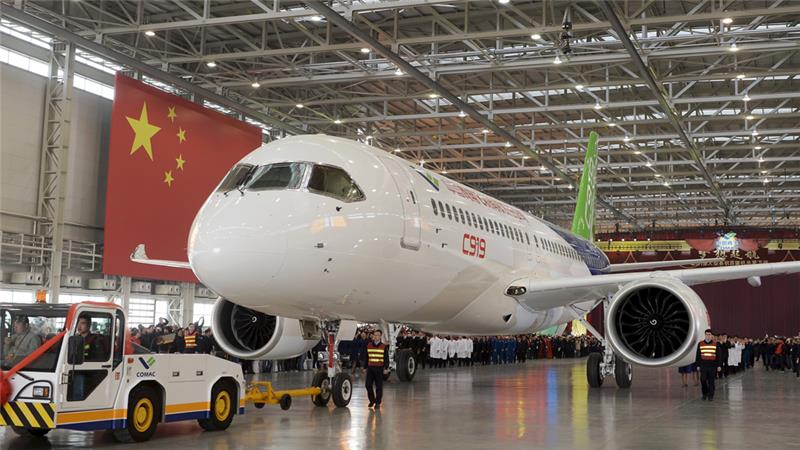The first plane produced by a Chinese government initiative to compete in the market for large passenger jetliners has been unveiled in Shanghai.
The Commercial Aircraft Corporation of China (COMAC) showed off its twin-engine C919 in a ceremony on Monday attended by some 4,000 government officials and other guests at a hangar near the Pudong International Airport.
China’s aviation market is growing fast but relies on Boeing and Airbus aircraft.
The ruling Communist Party wants to claw back some of the commercial benefits that flow to foreign suppliers.
Dependence on Boeing and Airbus
For China, the plane represents at least seven years of efforts in a state-mandated drive to reduce dependence on European consortium Airbus and Boeing of the United States, and even compete against them.
“China’s air transport industry cannot completely rely on imports. A great nation must have its own large commercial aircraft,” the country’s civil aviation chief Li Jiaxiang told an audience of government and industry officials.
A small truck towed the 39-metre long plane – painted white with a green tail – out of a cavernous building decorated with an enormous Chinese flag into the sunlight as project workers marched alongside, an AFP news agency journalist saw.
“The roll out of the first C919 aircraft marks a significant milestone in the development of China’s first indigenous aircraft,” COMAC chairman Jin Zhuanglong told the ceremony.
The aircraft, which has a range of up to 5,555 kilometres, will make its first test flight in 2016, he said – meaning that it will miss the original deadline of this year.
The China Daily newspaper has reported the maiden voyage could even be put back to 2017.
China has dreamed of building its own civil aircraft since the 1970s when Jiang Qing, leader Mao Zedong’s wife and a member of the notorious “Gang of Four”, personally backed an attempt to do so. But the Y-10’s heavy weight made it impractical and only three were ever made.
Although the C919 is made in China, foreign firms are playing key roles by supplying systems as well as the engines, which are made by CFM International, a joint venture between General Electric (GE) of the US and France’s Safran.
More than 500 orders
Spending on the C919 has not been revealed. Last month, the Export-Import Bank of China said it would provide state-owned COMAC with $7.9bn in finance for its aircraft projects.
The company already has orders for 517 of its C919 planes, according to a COMAC statement, almost all of them from domestic buyers. Among foreign customers, Thailand’s City Airways has ordered 10, according to an announcement last month.
But it will take years for the C919 to be delivered to customers, with the plane expected to enter service in 2019 at the earliest, industry officials said.
“There’s a lot of work to do still,” said Briand Greer, president for Asia-Pacific of Honeywell Aerospace, which is supplying four key systems for the C919: flight control, wheels and brakes, auxiliary power units and navigation.
“A lot of testing, a lot of flight testing, systems integration testing and of course all the certification,” he told AFP.
COMAC has already developed a smaller regional jet, the ARJ, in a project which is years behind schedule.
Test flights
The 78-90 seat ARJ is still undergoing test flights and lacks the crucial certification by the US Federal Aviation Administration that would enable it to fly in US skies.
The Chinese company also plans a wide body plane, the C929, in cooperation with Russia’s United Aircraft Corp., and speculation is mounting China will create a new aero-engine entity to try to produce the powerful jets needed for large civil aircraft.
China is expected to add 6,330 new aircraft worth $950bn to its commercial fleet by 2034, Boeing stimates.
The single-aisle C919 targets the lucrative segment dominated by Boeing’s 737 and the Airbus A320.
“Research and manufacturing of a big plane is complex,” said China’s Vice Premier Ma Kai, the highest government leader attending the ceremony. “There is still a long way to go to commercial operation.”











